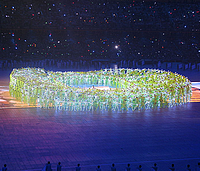BEIJING -- The 16th Asian Games, now underway in Guangzhou, China, are the latest in a long line of massive, intensively promoted "mega-events" organized by the Chinese state to showcase national development and achievement. These mega-events have few proven grassroots benefits, however, and are no replacement for the substantive, fundamental reforms the Chinese government itself admits are necessary to modernize the country. Moreover, this obsession with mega-events may be damaging to long-term development, and ultimately risks widening the gulf between the experiences of ordinary Chinese and the flag-waving, mixed-market utopia portrayed in state propaganda.
Since May 2008, eight distinct events on this scale have taken place in China, or one every three months. These have fallen into three categories: conventional events such as the Beijing Olympics, the Shanghai World's Fair and the 60th anniversary of the founding of the People's Republic of China; trophy projects such as the Chinese space program, which recently put the first Chinese astronaut in space, and the Antarctic exploration program, which last year dispatched the largest polar expedition ever seen; and natural disasters such as the Sichuan and Qinghai earthquakes, which are similarly co-opted as a vehicle for the Party's intended narrative of nationhood.
These events receive wall-to-wall coverage across the state's propaganda apparatus. With the advent of new media, opinion-shaping campaigns have become even more sophisticated and pervasive. Mega-events and trophy projects are deployed to inspire national pride and unity, with event highlights repeated over and over to the point of mind-numbing multimedia saturation. The treatment of natural disasters is unashamedly emotive, glorifying state services and government responses, while marginalizing valid criticisms as unpatriotic.

